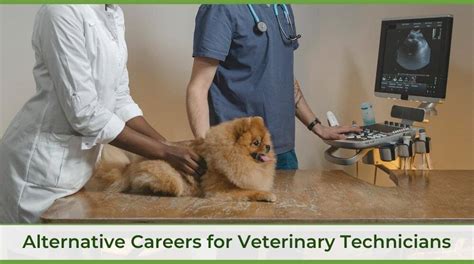As a veterinary technician, you've spent years honing your skills in the clinic, working alongside veterinarians to provide top-notch care for furry friends. But have you ever stopped to think about the many career paths available to vet techs beyond the clinic? The good news is that your skills are highly transferable, and you can leverage your experience and education to pursue a wide range of exciting and rewarding careers.
Why Explore Alternative Careers?
While working in a clinic can be fulfilling, it's not the only way to utilize your skills and make a difference in the lives of animals. Many vet techs choose to explore alternative careers due to factors such as:
- Burnout: The demands of working in a clinic can be high, leading to burnout and a desire for a change of pace.
- Limited career advancement: Career advancement opportunities may be limited in a clinic setting, leading vet techs to seek new challenges.
- Desire for work-life balance: Alternative careers may offer more flexible scheduling or better work-life balance, allowing vet techs to prioritize their personal lives.
Alternative Career Paths for Vet Techs
So, what are some alternative career paths available to vet techs? Let's explore some exciting options:
- Animal Behavior and Training: If you have a passion for understanding animal behavior and helping owners address behavioral issues, a career in animal behavior and training might be the perfect fit. You can work as a certified animal behaviorist, helping owners address issues such as fear, aggression, and anxiety.
- Animal-Assisted Therapy: Animal-assisted therapy (AAT) programs bring animals into hospitals, nursing homes, and rehabilitation centers to provide comfort and companionship to patients. As a vet tech, you can work in AAT, helping to facilitate these programs and bring joy to those in need.
- Conservation and Wildlife Rehabilitation: If you're passionate about conservation and wildlife, you can explore careers in wildlife rehabilitation, conservation organizations, or government agencies. Your skills as a vet tech can be applied to help care for injured or orphaned wildlife, or to work on conservation projects.
- Education and Research: You can share your knowledge and experience with others by working in education or research. This might involve teaching veterinary technology students, working in a research laboratory, or assisting with clinical trials.
- Industry and Sales: Many companies that manufacture animal health products or provide services to the veterinary industry hire vet techs to work in sales, marketing, or customer support. Your knowledge of veterinary medicine and procedures can be a valuable asset in these roles.
- Government and Public Health: Vet techs can work in government agencies, such as the USDA or FDA, or in public health organizations, helping to develop and implement policies related to animal health and welfare.
- Non-Profit and Animal Welfare Organizations: Many non-profit organizations, such as the Humane Society or the ASPCA, hire vet techs to work in animal welfare and advocacy. Your skills can be applied to help care for animals in shelters, or to work on advocacy campaigns.

Getting Started in an Alternative Career
If you're interested in exploring alternative careers, here are some steps to get started:
- Update your resume: Tailor your resume to highlight the skills and experience you've gained as a vet tech, and emphasize how they can be applied to alternative careers.
- Network: Reach out to professionals in your desired field and ask for advice or informational interviews. Attend industry events or conferences to learn more about alternative careers.
- Pursue additional education or certifications: Depending on the career path you choose, you may need to pursue additional education or certifications. For example, if you're interested in animal behavior and training, you might consider becoming a certified animal behaviorist.
- Volunteer: Volunteering can be a great way to gain experience and make connections in your desired field. Consider volunteering with organizations or companies that align with your career goals.






Conclusion: Beyond the Clinic
As a veterinary technician, you have a wide range of skills and experience that can be applied to many different careers. Don't be afraid to think outside the box and explore alternative career paths that align with your passions and interests. With the right mindset and preparation, you can find a rewarding and fulfilling career beyond the clinic.
What are some alternative career paths for vet techs?
+Vet techs can explore alternative careers such as animal behavior and training, animal-assisted therapy, conservation and wildlife rehabilitation, education and research, industry and sales, government and public health, and non-profit and animal welfare organizations.
What skills are transferable from a veterinary technician career?
+Vet techs possess a range of transferable skills, including animal handling and care, medical procedures, laboratory testing, and communication and interpersonal skills.
